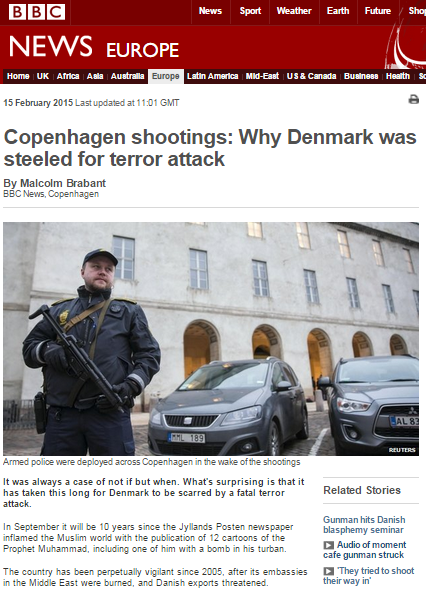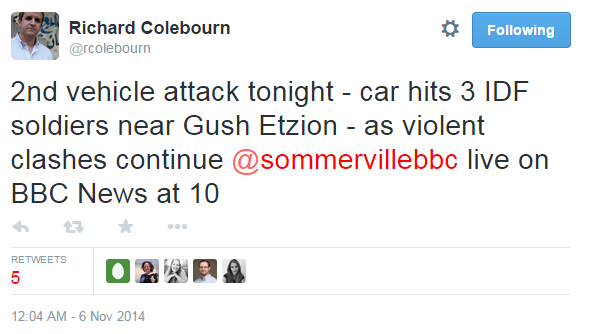The BBC News website’s coverage of the terror attacks in Copenhagen on February 14th and 15th has included several written reports. The attack at the Krudttønden cultural centre was reported in an article titled “Copenhagen shooting: One dead in deadly seminar attack” and the later attack at the city’s main synagogue was covered in a report currently headlined “Copenhagen shootings: Police kill ‘gunman’ after two attacks“.
In the ninth version of the second report, readers were told that:
“A Jewish community group quoted by AFP news agency later said that the man killed was Jewish and had been helping with a confirmation ceremony taking place inside the synagogue.”
In fact, AFP reported that:
“Michael Gelvan, chairman of the Nordic Jewish Security Council, told AFP the victim at the synagogue was a young Jewish man who had been providing security for a ceremony.”
Versions 10, 11 and 12 of the BBC’s article continued to inform readers that a “confirmation ceremony” was taking place at the synagogue at the time of the shootings. By version 13, somebody had apparently realized that was an unlikely scenario and the text was changed to read:
“A Jewish community group later said that the man killed had been on security duty while a Bar Mitzvah ceremony was taking place inside the synagogue.”
Several other media outlets have reported that the occasion being guarded by the victim, Dan Uzan, was actually a Bat Mitzva.
At the end of the first article, readers were informed that:
“Cartoons depicting the Prophet Muhammad were published by a Danish newspaper in 2005, sparking deadly riots in some Muslim countries.”
That topic was expanded in later versions of the second article in an insert of analysis from the BBC’s Malcolm Brabant in which he wrote:
“It was always a case of not if but when. What’s surprising is that it has taken this long for Denmark to be scarred by a fatal terror attack.
In September it will be 10 years since the Jyllands Posten newspaper inflamed the Muslim world with the publication of 12 cartoons of the Prophet Muhammad, including one of him with a bomb in his turban.
The country has been perpetually vigilant since 2005, after its embassies in the Middle East were burned and Danish exports threatened.”
Those words also opened an additional article by Brabant titled “Copenhagen shootings: Why Denmark was steeled for terror attack” which appeared on the BBC News website’s Europe page on February 15th.
But in fact, September 2015 will not mark a decade “since the Jyllands Posten newspaper inflamed the Muslim world”. A whole four months passed between the publication of the cartoons on September 30th 2005 and the violent protests and riots at various locations in late January and early February 2006 in which some 200 people were killed. The reason for that lapse of time is very significant to proper understanding of the story, as British writer Kenan Malik noted in 2010.
“Shortly after Jyllands Posten published the cartoons, the Egyptian newspaper Al Fagr reprinted them. They were accompanied by a critical commentary, but Al Fagr did not think it necessary to blank out Muhammad’s face, and faced no opprobrium for not doing so. Egypt’s religious and political authorities, even as they were demanding an apology from the Danish Prime Minister, raised no objections to Al Fagr’s full frontal photos.
So, if there is no universal prohibition to the depiction of Muhammad, why were Muslims universally appalled by the caricatures? They weren’t. And those that were, were driven by political zeal rather than theological fervour.
The publications of the cartoons in September 2005 caused no immediate reaction, even in Denmark. Only when journalists, disappointed by the lack of controversy, contacted a number of imams for their response, did Islamists begin to recognise the opportunity provided not just by the caricatures themselves but also by the sensitivity of Danish society to their publication.
Among the first contacted was the controversial cleric Ahmed Abu Laban, infamous for his support for Osama bin Laden and the 9/11 attacks. He seized upon the cartoons to transform himself into a spokesman for Denmark’s Muslims. Yet however hard he pushed, he initially found it difficult to provoke major outrage in Denmark or abroad. It took more than four months of often hysterical campaigning, and considerable arm-twisting by Saudi diplomats, to create a major controversy. At the end of January 2006, Saudi Arabia recalled its ambassador from Denmark and launched a consumer boycott of Danish goods. In response a swathe of European newspapers republished the cartoons in ‘solidarity’ with Jyllands-Posten.
It was only now that the issue became more than a minor diplomatic kerfuffle. There were demonstrations and riots in India, Pakistan, Indonesia, Egypt, Libya, Syria, Iran, Nigeria, Palestine, Afghanistan and elsewhere. Danish embassies in Damascus, Beirut and Teheran were torched. But, as Jytte Klausen has observed, these protests ‘were not caused by the cartoons, but were part of conflicts in pre-existing hot spots’ such as northern Nigeria, where there exists an effective civil war between Muslim salafists and Christians. The violence surrounding the cartoon conflict, Klausen suggests, has been ‘misreported’ as expressions of spontaneous violence from Muslims ‘confronted with bad pictures’. That, she insists, ‘is absolutely not the case’. Rather ‘these images have been exploited by political groups in the pre-existing conflict over Islam.’”
Clearly the BBC’s Copenhagen correspondent’s reframing of the ‘Danish cartoons’ story by means of an inaccurate timeline which erases its political aspects and turns it instead into one of offence to religious sentiments, not only misleads audiences with regard to the events of 2005/6 but also distracts from context vital to their understanding of contemporary events. And if readers are wondering why the BBC should be incapable of representing such a well-documented story accurately, the rest of Kenan Malik’s prescient essay provides some important insight.




